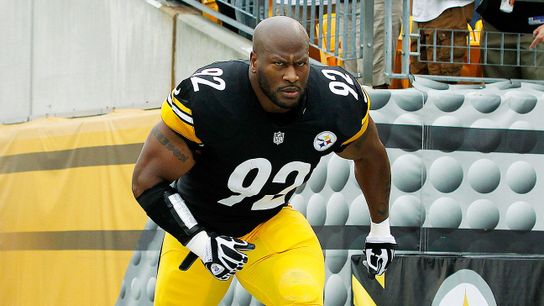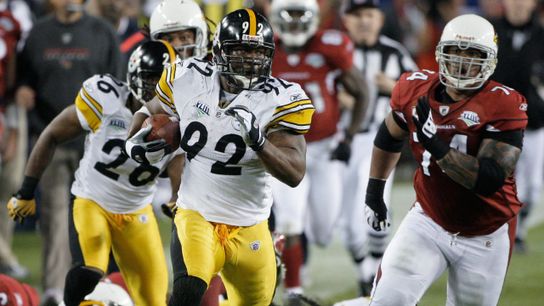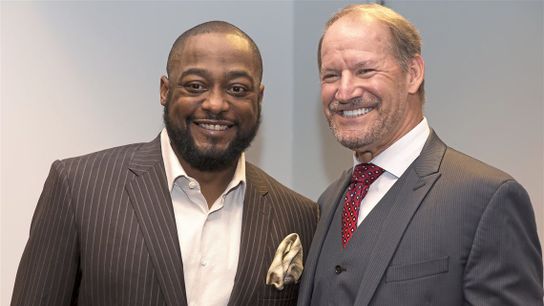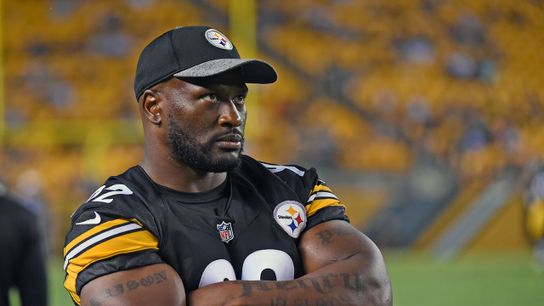The Pittsburgh Steelers and their fans enjoyed a decade of success during the 2000s. During that time, the team captured two Super Bowl titles in 2005 and 2008, and were led by Hall of Fame talent and Steelers legends. From Ben Roethlisberger throwing clutch touchdown passes, to Troy Polamalu making jaw-dropping interceptions, there were countless moments that Steelers fans will never forget. However, despite the glory of the 2000s, the 2010s brought noticeable change, and one former Steeler recently admitted things just didn’t feel the same.

ESPN
James Harrison running onto the field during player introductions at Heinz Field.
James Harrison is one of the greatest players in Steelers history, one of the best defensive players in NFL history, and arguably the greatest undrafted player to ever play in the league. Harrison was the leader of the Steelers' defense during his tenure in the Steel City, capturing an AP Defensive Player of the Year nod in 2008.
After the 2012 season, Harrison left the Steelers to join the division rival Cincinnati Bengals. Though he eventually returned to Pittsburgh during the 2014 season, things weren’t the same. That year marked the final season for several longtime Steelers legends, including Polamalu, Ike Taylor, and Brett Keisel. The roster was shifting, the culture was evolving, and Harrison noticed it. In a recent episode of his podcast with Joe Haden, Deebo & Joe, Harrison explained that the energy in the locker room felt different after his return.
“It wasn’t the same,” Harrison said. “You didn’t have the same where it was a whole team thing, you had your little cut-up groups, maybe it was offense and defense, where before it was just everybody.”
Harrison's return to Pittsburgh came during a changing of the tide. The Steelers were transitioning into a new era led by Head Coach Mike Tomlin and a new wave of standout players. Although Tomlin was in his seventh season as head coach, the locker room was now full of his players, not ones he inherited. Stars like Antonio Brown, Le’Veon Bell, Mike Mitchell, Vince Williams, and even Roethlisberger became notable players with their unique personalities. The team’s identity started to shift, it was no longer just about a unified group of players pushing together, it became more about the individuals themselves.

Steelers.com
Former Steelers linebacker James Harrison returns an interception for a touchdown against the Cardinals in Super Bowl XLIII, which is still considered one of the best plays in the history of the big game.
Anyone who has ever played football knows how important camaraderie and team chemistry are. The teams that glue together as a group are successful. The teams who don't, aren't. For Harrison, who thrived in the brotherhood-driven culture of the 2000s, this new dynamic was different, requiring adjustments both on and off the field. The Steelers were no longer about smash-mouth physical defense, as the Killer B's offense became their identity. Although the Steelers still saw their fair share of success during the mid-2010s, they never reached the same pinnacle that the 2000s teams did.
Steelers' Coaching Change Led To Culture Change
A big part of this cultural shift had to do with the changing of the guard at the coaching level. Bill Cowher, the hard-nosed, tough-on-players coach who had led the Steelers for 15 seasons, retired after the 2006 season and Tomlin was hired that same offseason. Many Steelers players, past and present, have raved about both Cowher and Tomlin. Both are two of the greatest and most respected coaches in NFL history, but with two very different styles.

Pittsburgh Post-Gazette
Current Steelers Head Coach Mike Tomlin (left) and former Steelers Head Coach Bill Cowher (right).
Where Cowher was intense and demanding, Tomlin leaned more toward being laid-back and player-friendly. Both coaches had their successes, Cowher with the Super Bowl XL win in 2005, and Tomlin with the Super Bowl XLIII victory in 2008, but the style and tone of the team inevitably changed, influencing how players interacted, how the locker room felt, and how the team played on the field.
What do you think about Harrison's comments? Do you think the Steelers' culture is different than it was in the 2000s? Let us know in the comments below!
#SteelerNation

